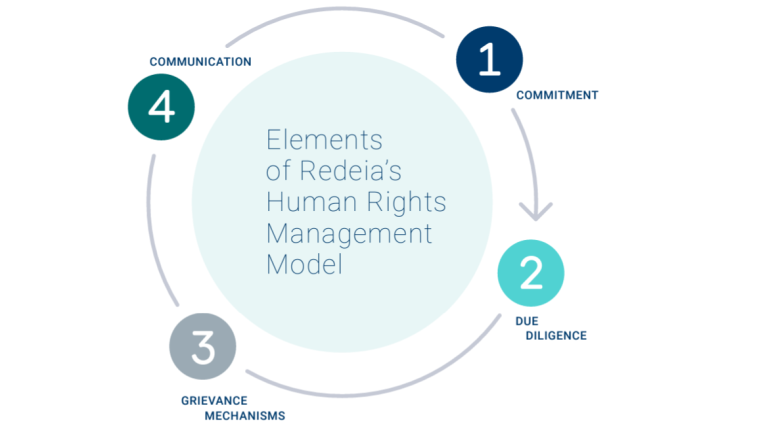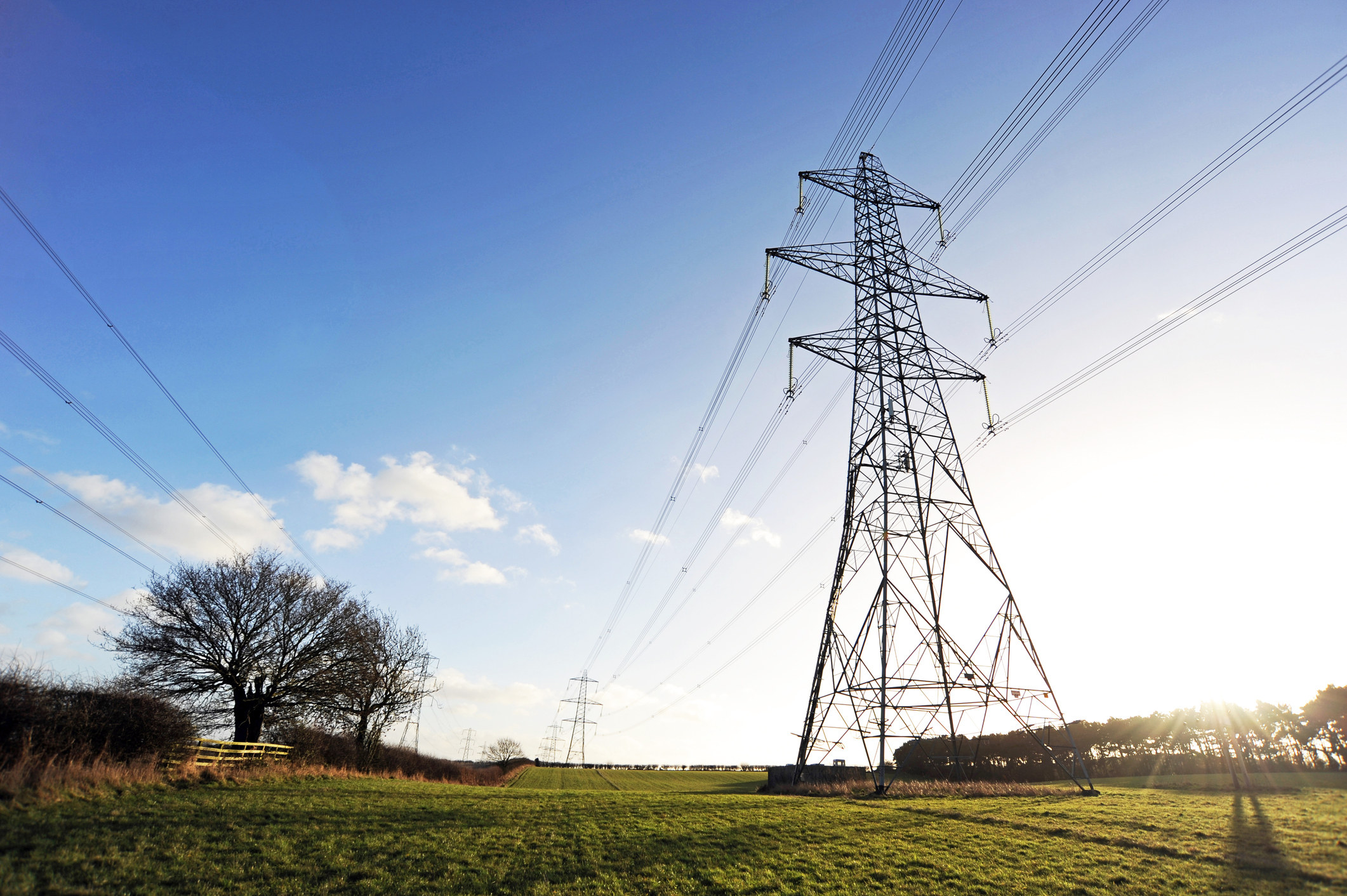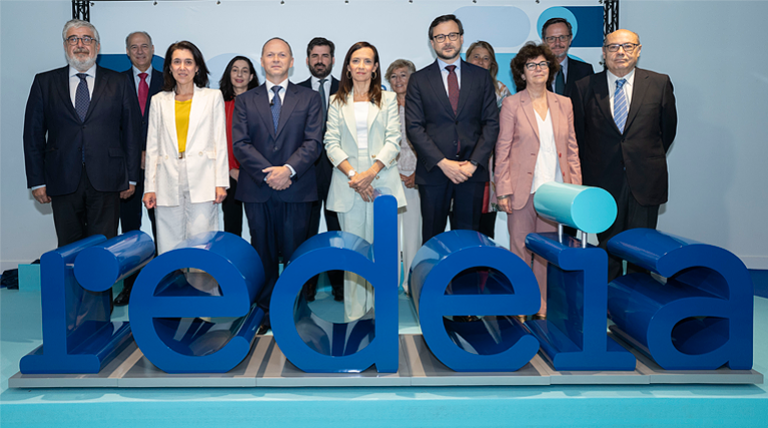We are a global operator of essential infrastructure
Human Rights
Human rights are, since the adoption of the Universal Declaration of Human Rights in 1948, the international standard that guarantees the recognition of individual freedoms and dignified living conditions to all people in the world. Redeia maintains an explicit and public Commitment to the respect and promotion of human rights in the development of its activity and conducts annual due diligence processes for own activities and for third party, which ensure this.
The result of these process has always evidenced that the company has a low level of risk, applies adequate controls for its management and reviews the relationships prior to their formalisation, therefore, to date it has not been necessary to implement any remediation action. However, in order to ensure continuous improvement in this area, Redeia periodically reviews the internal regulations governing these both mechanisms.
Redeia has a Human Rights Management Model, approved by the Sustainability Steering Committee, that structures and systematises the company's actions to protect and respect human rights, and to remedy any risk that may be caused in this area. This Management Model follows the methodology defined by the Guiding Principles on Business and Human Rights, proposed by the United Nations (UN), and is developed into the following elements:

Redeia maintains an explicit commitment to respect and protect human rights in all the territories and countries in which it operates, with special attention to vulnerable groups, and thus instils it in the corporate culture through the 10 Principles of Respect for Human Rights, included in the Commitment to the promotion and respect of human rights, the Code of Ethics and Conduct, and the Sustainability Policy. These Principles, which are periodically reviewed, have been drawn up taking into account internationally recognised human right (in the Universal Declaration of Human Rights, the International Covenant on Economic, Social and Cultural Rights and the core conventions of the International Labor Organization, the United Nations Guiding Principles on Business and Human Rights, the European Convention on Human Rights and the Social Charter of the European Union) the sectors in which Redeia operates and the grievance mechanisms that the company makes available to its stakeholders.
Redeia’s Commitment to human rights, approved by the Board of Directors, includes respect for and promotion of internationally recognized Human Rights. Due to the sectors and geography in which it operates, Redeia’s main Human Rights risks are forced labor, child labor, human trafficking, freedom of association, collective bargaining, equal pay, discrimination, health and safety, decent work, privacy and data security, identity and social, cultural and economic rights of indigenous peoples, private property, healthy environment and ethical management.
It also lists the rightholders on which the development of Redeia's activities could have a greater impact. These are own employees, women, children, indigenous people, migrant workers, third party employees, local communities, people with disabilities, LGBTI groups, ethnic minorities, landowners potentially affected by the purchase/sale of land and owners of property and land in the vicinity of existing facilities and the society as a whole.
International standards, current trends and emerging rights, as well as possible findings from the different complaint channels, are analysed annually to identify possible new human rights on which Redeia, because of its sector or geographic location, can have an impact. This analysis is also implemented in the event of a change in the company's perimeter.
In order to extend this behaviour along the supply chain, the human rights obligation is extended to suppliers through the Supplier Code of Conduct.
In addition, the company develops the necessary tools in terms of integrity and human rights due diligence, both for its own activities and in its relations with third parties, to mitigate the risk of Redeia being linked to third parties associated with conduct contrary to its ethical values.
Since 2013, Redeia conducts due diligence analyses on annual basis, covering all Redeia’s companies (including ARGO and TEN) to identify potential human rights risks arising from their direct and indirect activities.
Due diligence is the process by which a company's human rights impacts are identified, assessed, addressed, mitigated, and prevented. This mechanism, which is regulated by the company's internal regulation “Human rights due diligence Guide for own operations”, consists of three stages:
- Determination of potential and actual human rights impacts: based on the human rights and rights holders that Redeia is most likely to impact and human rights complaints that are collected through the whistle blow channels, a questionnaire is sent to a certain number of internal stakeholders to identify potential and actual negative impacts. These impacts are then prioritised and assessed using a proprietary methodology based on the probability of occurrence of the impact and its severity. The result is a map of human rights risks that Redeia is most likely to impact, which is updated annually.
- Implementation of measures to prevent, mitigate and remediate risks related to human rights: based on the results of the prioritisation of impacts, Redeia integrates the conclusions into the company's functions and processes and proposes and implements measures to prevent and/or mitigate the risks identified with specific improvement objectives. In the event of any human rights violation identified, Redeia must repair the damage caused and guarantee access to justice for the victims.
- Monitoring of the implemented measures: to assess the effectiveness of the measures implemented, Redeia conducts regular evaluations based on previously defined qualitative and quantitative indicators, at least every twelve months. If the measure has not produced the desired results and/or the damage caused persists, the measures implemented should be reviewed and, if necessary, employees and external stakeholders should be consulted to build new solutions in collaboration with the affected parties.
The result of this analysis has always shown that the company has a low level of risk, applies adequate controls for its management and, therefore, it has not been necessary to implement any remediation action. In order to ensure continuous improvement in this area, Redeia periodically reviews the internal regulations governing this mechanism.
According to this procedure, a human rights risk mapping of the companies that are part of Redeia was carried out in 2022. International regulations, current trends, emerging rights and whistle-blower channels have been considered. This mapping shows that, due to the sectors in which it operates, Redeia’s main human rights risks are forced labor, child labor, human trafficking, freedom of association, collective bargaining, equal pay, discrimination, health and safety, decent work, privacy and data security, identity and social, cultural and economic rights of indigenous peoples, private property, healthy environment and ethical management. In this sense, there are policies, commitments and control mechanisms in place to minimize these risks, ensure respect for human rights and remedy possible violations.
The due diligence process has also determined that the activities of Redeia in no case infringe on the human rights of any right holder. It should be noted that, although Peru has an indigenous population, there are no indigenous settlements or communities in the area directly influenced by Redeia’s activities and, therefore, there is no impact on the indigenous population. In the Commitment to the promotion and respect of human rights, Redeia undertakes to respect the freedom and rights of ethnic minorities and indigenous communities.
Furthermore, the company transfers its commitment to integrity and human rights to third parties with which it maintains or intends to maintain relations of any kind, applying due diligence measures according to the risk of the third party. This is regulated in the company's internal regulations “Integrity and Human Rights Guide for third parties”. Redeia conducts an analysis prior to the formalization of relationships with third parties to obtain information about their integrity and respect for human rights focusing on employees, vulnerable groups, landowners and the society as a whole. For this purpose, a series of due diligence measures have been established to be applied depending on the risk of the third party and the characteristics of the intended relationship. Relationship with the following third parties are obliged to carry out the process: corporate operations, business partners, external agents, administrators, management team, collaborating entities in the social environment, landowners and holders, suppliers and customers.
Redeia has an Ethics and Compliance Channel accessible to all its stakeholders, as a formal mechanism for responding to queries and complaints related to human rights. The company also has other communication channels, where they can communicate their concerns in this area, such as the DÍGAME Service, which manages complaints and attention from external stakeholders, and the ASA (Attention and Support for Procurement) channel for specific attention to suppliers.
In order to deal appropriately with stakeholder requests for possible human rights violations, Redeia provides ongoing training for employees who manage these channels.
Every year, Redeia publishes the results of the human rights due diligence process, including the potential and actual impacts identified, as well as the measures taken and the results thereof, through the annual Sustainability Report.
The company regularly promotes investments in internal and external communication and awareness-raising investments aimed at the Redeia's employees and suppliers.
2022 has been a year of progress in human rights, having carried out various actions that allow Redeia to be at the forefront of human rights protection. Because human rights impacts are dynamic, it is necessary to remain constantly vigilant. Therefore, Redeia updates the results of its human rights procedure on an annual basis. In this regard:
- The human rights risk map has been reviewed, analysing that Redeia's activity has not generated impacts on new groups and that the priority human rights that are most likely to be impacted by sector and geography have not increased.
- The prioritisation and evaluation of potential and real negative impacts has been updated, in accordance with the methodology, based on the probability of occurrence of the impact and its severity.
- The conclusions of the human rights risk map have been integrated into the company's functions and processes and risk prevention and mitigation measures have been implemented. No remediation measures have been necessary.
- It has been checked that all the risks identified are covered by internal procedures, presenting at least a high level of protection (risk covered by a strategy, plan or specific initiative at company level) so that their probability of occurrence or the seriousness of their impact is very low.
Processes implemented to mitigate human rights risks
During 2022, several processes have been implemented to mitigate those specific risks that were most likely to occur in the previous assessment, all of them related to working conditions and therefore to employees. These were:
- Digital disconnection: since the identification of this risk, Redeia has worked in several actions to mitigate it.
- Redeia has a digital disconnection procedure, approved in February 2022. To ensure its correct implementation, it has been accompanied by a communication plan aimed at raising awareness of the importance of digital disconnection and several measures have been deployed to improve health and quality, with advice to employees on how to effectively apply digital disconnection.
- During 2022, the employees who work in the various offices of the Company enjoyed part-time remote working, being able to carry out their activities from their homes in the afternoon (17% of the working day).
- With regard to geographical flexibility, 54% of the workforce has the possibility of working remotely for around 47% of their annual working days, being able to choose to do so from up to two different locations (generally first and second residences).
- Excessive working hours: this risk was also identified as having a medium probability of occurrence. To mitigate this risk the company is developing some projects.
- In 2023, Redeia is also making progress on the new "on-time" time management system project, on the basis of which rules will be drawn up to guarantee maximum working hours, among many other digital disconnection measures.
- Psychosocial risk, arising from excessive workloads, stress, lack of motivation, negative work climate, etc., was also identified as a probable risk. In order to mitigate this risk, Redeia:
- In 2022, the "Emotion" project was carried out to incorporate emotional management into the prevention of occupational risks in the highest risk activities. This project has been deployed in three areas:
- Inclusion of emotional perception in safety talks before starting work.
- Training of leaders in emotional management.
- Application in the prevention of occupational risks through the evaluation of the emotional profile of each participating group and the determination of their safety competencies, through a methodology that relates personality and accident rate.
- In addition, a personal support service has once again been activated. This psychological assistance service was set up in response to the impact that the COVID-19 pandemic could have on psychosocial health and has now been reintroduced. The service guarantees remote psychological assistance, via a telephone number or e-mail. This service is available to everyone in Redeia.
- In 2022, the "Emotion" project was carried out to incorporate emotional management into the prevention of occupational risks in the highest risk activities. This project has been deployed in three areas:
More information regarding these and other measures can be found in the Healthy Workplace Report 2022.
Monitoring of processes implemented to mitigate human rights risks
Redeia develops a monitoring system that analyses the functioning of potential impact mitigation measures and identifies whether it has succeeded in preventing or mitigating their occurrence.
In the same way as human rights, mitigation measures must also be constantly supervised, and their effectiveness monitored. In this regard, the possibility of occurrence of these events has been reassessed with Redeia employees to see if the mitigation measures have had an effect.
- In the case of psychosocial risks, the probability of occurrence has decreased its score compared to the previous year's self-diagnostic survey, by 25%, while the perception of excessive working hours has decreased by more than 10%.
- Digital disconnection measures have decreased the sense of likelihood of occurrence of this risk by 9%.
Remediation action
To date, no remediation action has been necessary because no risk has materialized.
However, Redeia, aware that human rights risks are dynamic, continues to regularly check that they do not materialise.














